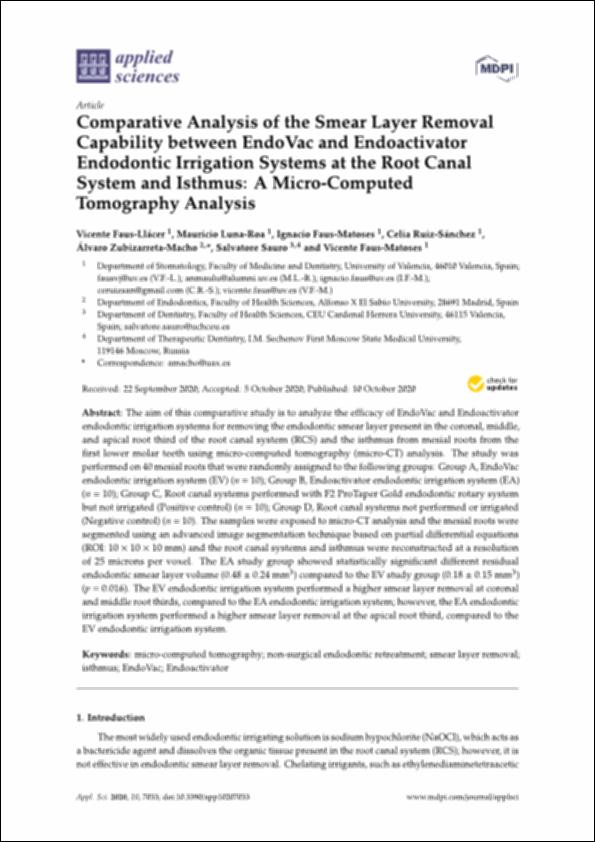Por favor, use este identificador para citar o enlazar este ítem:
http://hdl.handle.net/10637/12557Comparative analysis of the smear layer removal capability between EndoVac and Endoactivator endodontic irrigation systems at the root canal system and isthmus: a micro-computed tomography analysis
| Título : | Comparative analysis of the smear layer removal capability between EndoVac and Endoactivator endodontic irrigation systems at the root canal system and isthmus: a micro-computed tomography analysis |
| Autor : | Faus Llácer, Vicente Luna Roa, Mauricio Faus Matoses, Ignacio Ruiz Sánchez, Celia Zubizarreta Macho, Álvaro Sauro, Salvatore. Faus Matoses, Vicente |
| Materias: | Teeth - Tomography.; Endodoncia.; Endodontics.; Dental therapeutics - Equipment and supplies.; Teeth - Roots - Planing.; Dientes - Tomografía.; Terapéutica dental - Aparatos y material.; Dientes - Cavidades - Preparación. |
| Editorial : | MDPI |
| Citación : | Faus-Llácer, V., Luna-Roa, M., Faus-Matoses, I., Ruiz-Sánchez, C., Zubizarreta-Macho, Á., Sauro, S. et al. (2020). Comparative analysis of the smear layer removal capability between EndoVac and Endoactivator endodontic irrigation systems at the root canal system and isthmus: a micro-computed tomography analysis. Applied Sciences, vol. 10, i. 20 (10 oct.), art. 7033. DOI: https://doi.org/10.3390/app10207033 |
| Resumen : | The aim of this comparative study is to analyze the e cacy of EndoVac and Endoactivator endodontic irrigation systems for removing the endodontic smear layer present in the coronal, middle, and apical root third of the root canal system (RCS) and the isthmus from mesial roots from the first lower molar teeth using micro-computed tomography (micro-CT) analysis. The study was performed on 40 mesial roots that were randomly assigned to the following groups: Group A, EndoVac endodontic irrigation system (EV) (n = 10); Group B, Endoactivator endodontic irrigation system (EA) (n = 10); Group C, Root canal systems performed with F2 ProTaper Gold endodontic rotary system but not irrigated (Positive control) (n = 10); Group D, Root canal systems not performed or irrigated (Negative control) (n = 10). The samples were exposed to micro-CT analysis and the mesial roots were segmented using an advanced image segmentation technique based on partial di erential equations (ROI: 10 10 10 mm) and the root canal systems and isthmus were reconstructed at a resolution of 25 microns per voxel. The EA study group showed statistically significant di erent residual endodontic smear layer volume (0.48 0.24 mm3) compared to the EV study group (0.18 0.15 mm3) (p = 0.016). The EV endodontic irrigation system performed a higher smear layer removal at coronal and middle root thirds, compared to the EA endodontic irrigation system; however, the EA endodontic irrigation system performed a higher smear layer removal at the apical root third, compared to the EV endodontic irrigation system. |
| Descripción : | Este artículo se encuentra disponible en la siguiente URL: https://www.mdpi.com/2076-3417/10/20/7033 Este artículo pertenece al número especial "Applied simulation and experiment research in dentistry". |
| URI : | http://hdl.handle.net/10637/12557 |
| Derechos: | http://creativecommons.org/licenses/by/4.0/deed.es |
| ISSN : | 2076-3417 (Electrónico). |
| Fecha de publicación : | 10-oct-2020 |
| Centro : | Universidad Cardenal Herrera-CEU |
| Aparece en las colecciones: | Dpto. Odontología |
Los ítems de DSpace están protegidos por copyright, con todos los derechos reservados, a menos que se indique lo contrario.


